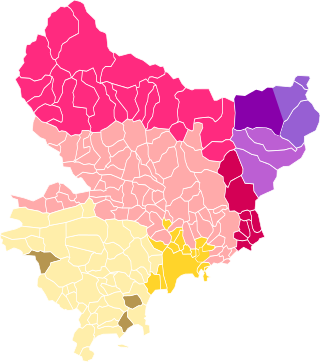Claire Moyse-Faurie | |
|---|---|
 Claire Moyse-Faurie in New Caledonia in 2014. |
Claire Moyse-Faurie (born 7 October 1949) [1] is a French linguist specializing in Oceanic languages, in particular the languages of Wallis and Futuna and of New Caledonia.
Claire Moyse-Faurie | |
|---|---|
 Claire Moyse-Faurie in New Caledonia in 2014. |
Claire Moyse-Faurie (born 7 October 1949) [1] is a French linguist specializing in Oceanic languages, in particular the languages of Wallis and Futuna and of New Caledonia.
Moyse-Faurie studied with the linguist André-Georges Haudricourt. [2] After many years working at LACITO (CNRS) from 1980 onwards, including serving as its deputy director from 1992 to 1995, Moyse-Faurie became emeritus director of research at Lattice in 2021. [3] [4] [5] She held a visiting position as professor at the University of New Caledonia in 2004, 2005, 2013, 2014 and 2015. [4]
Moyse-Faurie was appointed Member of the Academia Europaea in 2016. [6] She also served as President of the Société de Linguistique de Paris in 2012. [4] [7]
Alongside descriptive studies of Oceanic languages (Drehu, Xârâcùù, Xârâgurè, West Uvean, Haméa, East Futunan, East Uvean), Moyse-Faurie has worked on linguistic topics such as valency, nominalization, reflexives, reciprocals, grammaticalization, and linguistic typology. [6] In 1982 she proposed an orthography for this language, which has subsequently been used in teaching; she also published a dictionary of Xârâcùù together with Marie-Adèle Néchérö-Jorédié in 1986. [2]
In grammar, a reflexive verb is, loosely, a verb whose direct object is the same as its subject, for example, "I wash myself". More generally, a reflexive verb has the same semantic agent and patient. For example, the English verb to perjure is reflexive, since one can only perjure oneself. In a wider sense, the term refers to any verb form whose grammatical object is a reflexive pronoun, regardless of semantics; such verbs are also more broadly referred to as pronominal verbs, especially in the grammar of the Romance languages. Other kinds of pronominal verbs are reciprocal, passive, subjective, and idiomatic. The presence of the reflexive pronoun changes the meaning of a verb, e.g., Spanish abonar to pay, abonarse to subscribe.

Niçard, nissart/Niçart, niçois, or nizzardo is the dialect that was historically spoken in the city of Nice, in France, and in a few surrounding communes. Niçard is a subdialect of Provençal, itself a dialect of Occitan. Some Italian irredentists have claimed it as a Ligurian dialect, on false grounds.
Paicî is the most widely spoken of the two dozen languages on the main island of New Caledonia. It is spoken in a band across the center of the island, in the communes of Poindimié, Ponérihouen, Koné and Poya.
Wallisian, or ʻUvean, is the Polynesian language spoken on Wallis Island. The language is also known as East Uvean to distinguish it from the related West Uvean language spoken on the outlier island of Ouvéa near New Caledonia. The latter island was colonised from Wallis Island in the 18th century.
Futunan or Futunian is the Polynesian language spoken on Futuna. The term East-Futunan is also used to distinguish it from the related West Futunan (Futuna-Aniwan) spoken on the outlier islands of Futuna and Aniwa in Vanuatu.
André-Georges Haudricourt was a French botanist, anthropologist and linguist.
Iaai is a language of Ouvéa Island. It shares the island of Ouvéa with Fagauvea, a Polynesian outlier language.

Bernard Cerquiglini, is a French linguist.
Cèmuhî is an Oceanic language spoken on the island of New Caledonia, in the area of Poindimié, Koné, and Touho. The language has approximately 3,300 speakers and is considered a regional language of France.

Alexandre François is a French linguist specialising in the description and study of the indigenous languages of Melanesia. He belongs to Lattice, a research centre of the CNRS and École Normale Supérieure dedicated to linguistics.
The Bongo–Bagirmi or Sara–Bongo–Bagirmi languages are the major branch of the Central Sudanic language family with about forty languages. Principal groups include Bagirmi languages such as Naba and the Sara languages. They are spoken across CAR, Chad, South Sudan, and adjacent countries.
Denise Bernot was a French academic who was professor of Burmese at the Institut national des langues et civilisations orientales from 1960 to 1989. She was the widow of Lucien Bernot (1919–1993) who was professor at the Collège de France in the chair 'Sociographie de l'Asie du Sud-Est'. She was an alumna of the École des Chartes.
Xârâcùù, or Kanala, is an Oceanic language spoken in New Caledonia. It has about 5,000 speakers. Xârâcùù is most commonly spoken in the south Central area of New Caledonia in and around the city of Canala and the municipalities of Canala, Thio, and Boulouparis.
Françoise Ozanne-Rivierre (1941–2007) was a French linguist based at LACITO–CNRS, internationally known for her work on the languages of New Caledonia.
Jawe is one of the Kanak languages spoken in the northern province of the largest island of New Caledonia named Grande Terre. Jawe speakers are located along the northeast coast of the island, north of Hienghène and south of Pouébo; primarily in the Cascada de Tao region, Tchambouenne, and in the upper valleys of both sides of the centrally dividing mountain range.
Xavier Delamarre is a French linguist, lexicographer, and former diplomat. He is regarded as one of the world's foremost authorities on the Gaulish language.
Mena B. Lafkioui is a linguist specializing in Berber languages. She is currently Research Director at the French National Centre for Scientific Research and Professor of Berber Linguistics at the School for Advanced Studies in the Social Sciences.

Isabelle Bril is a senior researcher at the French National Centre for Scientific Research and a member of LACITO specializing in morphosyntax, semantics, typology, and Austronesian languages.
Jean-Marie Dallet was a White Father and a linguist specialized in Berber studies, particularly in the Kabyle language.
Martine Vanhove is a French linguist, Research Director emerita at LLACAN (CNRS), specializing in Cushitic and Semitic languages spoken in Djibouti, Yemen and Malta.